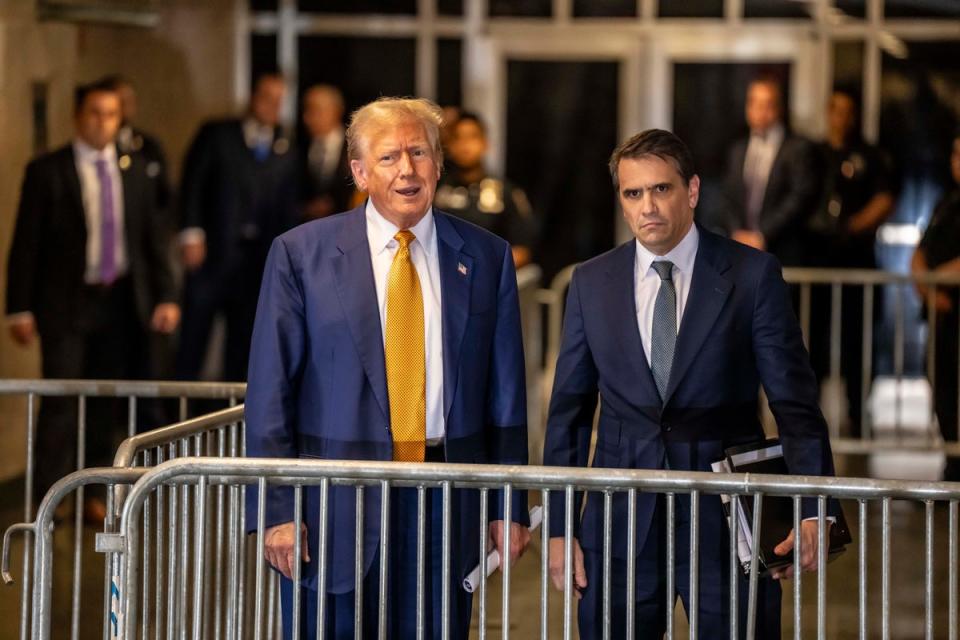Trump falsely claims trial gag order means he’s not allowed to testify
Donald Trump falsely claimed on Thursday that his hush-money trial gag order means that he isn’t “allowed” to testify as part of his defence.
Mr Trump was hit with a gag order in March preventing him from commenting publicly about witnesses, prosecutors, court staff and jurors in his hush-money trial, in which he is charged with 34 felony counts of falsifying business records in an alleged bid to cover up hush money payments to adult film star Stormy Daniels – all of which he denies.
The order prohibits Mr Trump from commenting about the trial on Truth Social or to the media, but it does not, however, impact Mr Trump’s right to testify in his trial.
Nonetheless, Mr Trump baselessly claimed on Thursday that the gag order would block his testimony.
“Well, I’m not allowed to testify, I’m under a gag order I guess, right?” Mr Trump told reporters outside a Manhattan courthouse after being asked when he intends to take the stand.
“I can’t even testify ... No, we’re going to be appealing the gag order. I’d love to answer that question ... but I’m not allowed to testify,” he added.

“It’s such a rigged court,” he continued. “I’m not allowed to testify because of an unconstitutional gag order. We’re appealing the gag order and let’s see what happens.”
Following Mr Trump’s remarks, legal experts were quick to point out that gag orders, including Judge Merchan’s order imposed on Mr Trump, never prevent criminal defendants from testifying during their trials.
“The gag order has nothing to do with that,” lawyer Karen Friedman Agnifilo told CNN. “Of course [Trump] can testify. He has an absolute right to testify and he is not restricted in terms of what he can talk about as long as it’s relevant, admissible evidence.”
“The gag order has nothing to do with his testimony at trial, perhaps he’s confused about that,” she continued. “It only talks about statements outside of court.”
Meanwhile, others expressed concerns that a genuine misunderstanding about his rights at trial could form the basis of a successful appeal if he is convicted.
“A conviction can be overturned on appeal if a defendant can show that he didn’t understand his right to testify at a criminal trial,” former federal prosecutor Ron Filipkowski wrote in a post on X. “It is common for a judge to now question the defendant directly about his understanding of his right to testify, which Merchan should do now.”
“Since Todd Blanche nodded his head yes when Trump claimed that his right to testify has been taken away because of the gag order, Merchan must start the day tomorrow inquiring of Trump’s understanding AND whether Blanche misadvised him on his 5th Amendment rights,” Mr Filipkowski added in another post.
Mr Trump has previously been accused of breaking the gag order several times during his trial, with Judge Merchan imposing a $9,000 fine on the former president last week for nine offending Truth Social posts where he attacked witnesses in the case.
In his written order, the judge warned that Mr Trump could face an “incarceratory punishment” if he continues his “wilful violations” of the court’s order, if “necessary and appropriate under the circumstances”.
Mr Trump’s defence attorney Todd Blanche argued that the former president’s posts were responding to “political” attacks but failed to offer up any examples of what, exactly, Mr Trump was responding to.
Judge Merchan appeared wholly unconvinced. “You presented nothing,” he told Mr Trump’s attorney. “You’re losing all credibility, I’ll tell you that right now.”
Since then, prosecutors have alleged four more violations from the first days of witness testimony alone, including statements Mr Trump gave just outside the courtroom’s doors – taking the number of alleged violations to 13 since the initial order was issued in March.
